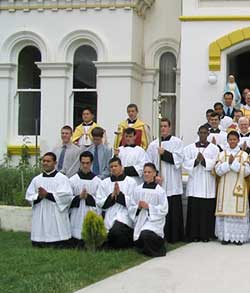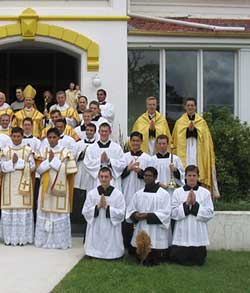

![]()
![]()
|
Newsletter of the District of Asia July - December 2004 Editorial
We have all, I am sure, had the experience of trying to convince family members, friends, acquaintances, of the truth of Catholic Tradition and of the necessity to hold on to, or to return to the Traditional Latin Mass. And we have all, no doubt, noticed that even with the best argumentation, results have rarely been to our expectation. Few people, very few, at the end of the day, see the logic of our reasoning, and among those who do see it, fewer still actually make the step towards Tradition. These apparently rare fruits of sometimes great labor must not discourage us. Let me give you two reasons. Firstly, on the part of God, He does not think like man, nor judge according to the appearances. Our apparent failure with this or that soul, may actually bring the grace either later only, or may bring it to another soul elsewhere! God wants to see whether we work for ourselves or for Him, whether we will continue to fight even when it seems useless, humanly speaking, leaving the victory, the fruits to His Wisdom. For God, one soul in the state of grace is more precious than the whole universe; one soul that approaches Him seriously in the spiritual life, that seeks to climb the various stages of interior life for Him, pleases Him more than many others who remain lukewarm and have no earnest desire. St John of the Cross even said, in a famous text, that, for God, " An instant of this pure love" (for those who have reached the highest level of spiritual life), "is more precious in the sight of the Lord and of the soul itself, and of greater use to the Church... than all other (external) works united together." (Canticle, XXE, 2)
Nov. 6, 2004, Holy Cross Seminary, Australia.
Secondly, such harvests — apparently disproportioned to the efforts invested — have been observed since apostolic times, since the Incarnation, in fact. All of Jerusalem heard the coming of the Wise Men from the East announcing the birth of the Divine King, and "al1 Jerusalem was troubled" at hearing this, but how many took care to walk these 8 km to Bethlehem, at least out of curiosity? None. Not a single soul. The only ones who went were the Three Kings, who were not from Jerusalem. Our Lord truly came into His own, and His own received Him not. When He began to preach in a way totally different from the Pharisees, with majesty and authority, with humility and meekness, He, the divine Wisdom, using the best images, arguments, parables, how many were converted and truly convinced? Crowds did come to listen, were moved by the astonishing miracles, indeed, but it was not very deep. When Our Blessed Lord start asking real faith in His Words, such as, in the great Discourse on the Bread of Life, the results were, humanly speaking, disastrous! He was even about to loose His own Apostles! " 'I am the living bread which came down out of heaven: if any man eat of this bread, he shall live for ever: yea and the bread which I will give is My flesh, for the life of the world.' The Jews therefore strove one with another, saying, 'How can this man give us his flesh to eat?' Jesus therefore said unto them, 'Verily, verily, I say unto you, Except ye eat the flesh of the Son of man and drink His blood, ye have not life in yourselves. He that eateth My flesh and drinketh My blood hath eternal life: and I will raise him up at the last day. 0o. 6, 51-54). "Upon (hearing) this many of his disciples went back, and walked no more with Him." (v. 66) Even the Apostles were shaken. But Our Lord did not cease to preach after this sermon, He went on sowing the divine seed until His last breath on the Cross. "Let him who can understand, understand!" Moreover, though He did not need it — but for our sake and example — He watered the seed of His own words with prayers and sacrifices, spending sometimes the whole night in prayer, especially before great events, such as before the choice of the 12 Apostles. This was Our Lord Jesus Christ, the Son of the Father, who spoke the very words of the Father, at the command of the Father. The fruits were not all visible at the very moment He spoke. But He has borne fruit soon after and is still bearing fruit 2000 years later!! For the Apostles, it was no different. It is clear, when reading the Acts of the Apostles, that it was usually the little number that opened their hearts to divine grace and followed the Apostles. Apart from the 3000 and 5000 of Pentecost and the days that followed, 'net fishing' of souls was rare. Most often, souls were caught 'line fishing', one by one, or a few at the time, a few here, a few there. After reasoning for three weeks with the Thessalonians (Acts 17,4-8), "some of them believed" and the others, moved with envy, made a tumult, stirred up the people and the rulers of the city and forced Paul and his companion Silas to go away. In Athens (Acts 17, 18-34), among the intellectuals, St Paul gave one of his best prepared sermons, a philosophical one, well constructed. Result: only a few believed, among whom two names are given. In Ephesus (Acts 19,1-7), St Paul started with only 12 in his new 'mass center'! And it goes on and on like that. St Luke ends his book of the Acts on the same note. St Paul had arrived in Rome as a prisoner, in the year 62 A.D. All kind of Jews were coming to see and listen to him. "They came to him into his lodging in great number; to whom he expounded [the matter,] testifying the kingdom of God, and persuading them concerning Jesus, both from the law of Moses and from the prophets, from morning till evening. And some believed the things which were spoken, and some disbelieved. St Paul is using the argument of Scriptural Tradition: "from the law of Moses and from the prophets", arguing for long hours: "from morning till evening". This was at the end of his life, at a time when he had so much experience in talking to the Jews and Gentiles, knowing which arguments worked best, which quotes to use, etc. The result? "Some believed,... and some disbelieved." In our Asian Missions, it is no different. St Paul used the best arguments of Scriptural Tradition to prove the divinity of Our Lord, the promised Messiah, we try to use the best arguments from the Church's Tradition, from the Magisterium, from history (which always repeats itself), from the Saints' teachings and examples. Result? "Some believe, ... and some disbelieve." Let us not forget that lest we become discouraged as the battle drags unto its forth decade. "The servant is not greater than His Master" (Jo 13, 16) Following the example of Our Lord, whenever we are about to meet someone or, even in the midst of a discussion with someone, let us not forget to pray! And to do some sacrifices, if some are possible at that moment. For instance if the discussion takes place during a meal, sacrifice yourself in some ways on the food and the drinks, discreetly, to win the desired grace. Do not forget, that we can convince the minds with our clever presentation, but it is God's grace that moves the heart. Many times in the liturgy Mother Church puts such words on our lips, prayers such as these:"... grant we bessech Thee, that as we know Thy truth, so we may follow it by worthy lives." (18th Sunday after Pent., secreta) My wish for you all during this Christmas season and the New Year is that each one of us succeed in bringing one soul, at least one, to Our Divine Redeemer. Thus we will secure our own salvation, as St James wrote: "My brethren, if any among you err from the truth, and one convert him; let him know, that he who converteth a sinner from the error of his way shall save a soul from death, and shall cover a multitude of sins." (5, 20) Blessed Christmas & Holy New Year!
Fr. Daniel Couture |

